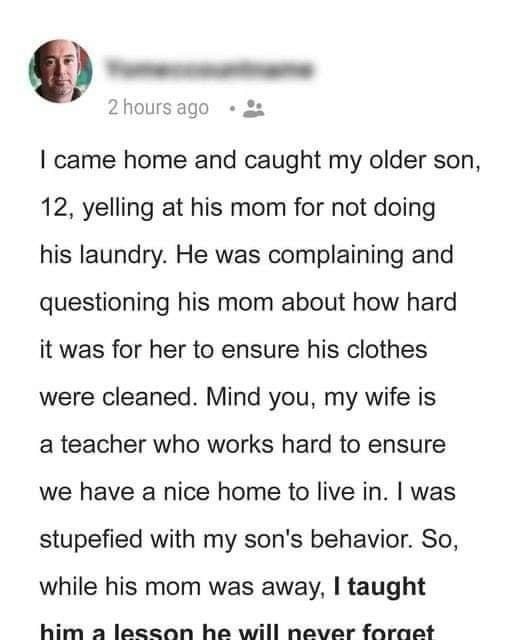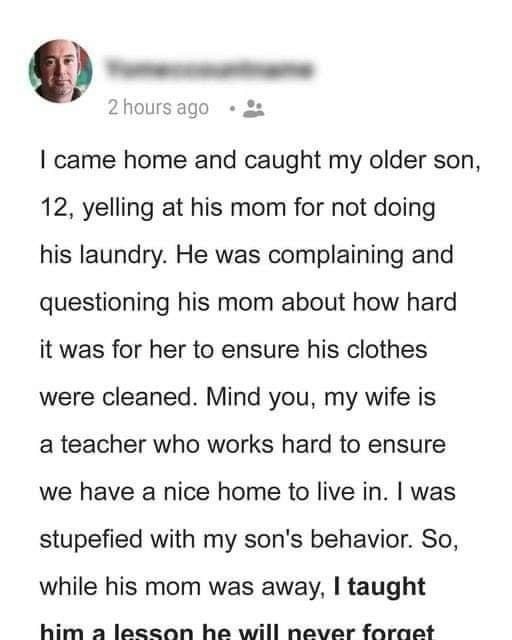I arrived home one late afternoon, tired from a busy day at work, hoping to relax with my family. As I walked through the front door, I immediately heard raised voices coming from the hallway. It sounded like my older son, Marcus, who is 12 years old, was shouting at someone. I set down my briefcase, removed my shoes, and followed the sound until I found him standing in front of his mother—my wife, Laura—his face twisted with anger.

He was ranting about how he had no clean pants to wear to school the next day, and he couldn’t believe she had forgotten to wash them. His voice was loud and sharp, and it made me cringe to hear him speak to his mom that way. Laura looked tired and small in the face of his anger, which only made me feel angrier. I knew Laura had just come home from her teaching job not too long ago. She always worked hard, juggling lesson plans, grading papers, and helping keep our household running.
Yet there was Marcus, accusing her of not doing enough, as if she were some kind of personal servant. “How hard is it for you to make sure the laundry is done?” he demanded, throwing his hands in the air. I felt my own cheeks burn with shock. Who had taught him to speak to his mother like this?
I was about to step in and reprimand him, but Laura shot me a look, silently telling me she would handle it for now. She calmly told him that she was sorry the laundry hadn’t been finished, but he needed to remember to treat her with respect. Marcus just rolled his eyes, muttering under his breath, and stormed off to his room. I could tell Laura was hurt by his words. She sighed deeply and went to the kitchen to start dinner, as though this was just another chore on her long list.
Later that evening, Laura had a school event she needed to attend—a parent-teacher meeting. She apologized for leaving the cooking to me, but I smiled and told her to go ahead. I wanted her to know I supported her. That left me alone with Marcus and his younger brother, Danny, who was six. Danny was in the living room playing with toy cars, blissfully unaware of the tension in the house.
As soon as Laura was gone, I realized this was my chance to teach Marcus a lesson. His disrespectful attitude couldn’t go unaddressed. I found him sprawled on his bed, listening to music through his headphones. I tapped him on the shoulder. When he pulled off his headphones, I looked him in the eye and said, “We need to talk.”
He made a face, probably expecting a long lecture. But I had another idea. “Get dressed,” I told him. “We’re going to do some chores.” He opened his mouth to protest, but something in my voice must have told him I meant business. Grudgingly, he followed me to the laundry room.
I turned on the overhead light and pointed at the baskets piled with clothes. “You think it’s easy to keep this family’s laundry clean? Let’s see how easy it is.” I handed him a heaping basket of dirty clothes. “Start separating them: lights here, darks there. Any delicate fabrics go in this smaller pile.” He blinked, looking confused. “But Dad—” he began to argue, and I cut him off. “No buts. You want clean clothes, you do your part. Now get to work.”
I stood beside him, showing him how to check labels on clothes and sort them. He stared at the mountain of laundry, and I could see a spark of realization in his eyes—that there was more to this than just tossing clothes in a machine. As he started sorting, I explained how each load might need different water temperatures, different washing cycles, and how some items couldn’t go in the dryer. It was tedious and time-consuming, but it needed to be done.
While one load was washing, I took him to the kitchen. “Next lesson,” I said. “Dinner won’t cook itself.” Then I had him help me prepare a simple meal. We washed vegetables, boiled some pasta, and grilled chicken. At first, he complained about the heat from the stove and the smell of onions making his eyes water. I told him it was all part of the process. “Your mom does this nearly every day,” I reminded him. “Remember that next time you open your mouth to insult her.”
After we finished cooking, I told Marcus to set the table. He grabbed plates, forks, and napkins, placing them neatly, though he grumbled under his breath. Meanwhile, I quickly checked on Danny, who was still busy playing. Then we returned to the laundry room, switching the load from the washer to the dryer, and starting another load. Marcus wiped sweat from his forehead, looking already exhausted.
When everything was ready, we sat down to eat. I noticed Marcus seemed quieter than usual, perhaps reflecting on what he had just learned. After dinner, I made him fold the first load of laundry that came out of the dryer. He fumbled with a few shirts, trying to fold them neatly. The frustration on his face told me this was harder than he had assumed. I stood there to guide him, but I didn’t do the work for him.
We kept at it for a couple more hours—finishing two loads of laundry, folding them, and putting them away. By the time we were done, Marcus’s eyelids drooped with fatigue. “Dad, this is so much work,” he complained, his voice softer than before. I nodded calmly. “Yes, it is. Your mother does it all the time, along with her full-time job as a teacher. She does it for our family without complaining.”
His eyes met mine, and I could tell something had clicked in his mind. He mumbled an apology under his breath, saying he didn’t realize how much work went into simple things like washing clothes and cooking dinner. I accepted his apology but told him the real apology he owed was to his mom. “She’s the one you disrespected,” I said. “Make sure she knows how sorry you are.”
When Laura came home that night, Marcus rushed to her side as she walked in. He wrapped his arms around her, much to her surprise. “I’m sorry, Mom,” he said quietly, his voice shaky. “I didn’t know how hard you worked. I’m sorry for yelling at you.” Her eyes widened, then she smiled gently, hugging him back. I saw tears forming in the corners of her eyes, not from sadness but from relief and gratitude.
The next day, Marcus woke up earlier than usual. He met me in the kitchen as I was making coffee. “Dad, can you show me how to start the washer?” he asked. “I want to make sure my clothes are clean for school.” My heart warmed, seeing that he had truly absorbed the lesson. I patted his shoulder and nodded, guiding him again on which settings to use.
From that point on, Marcus began helping out more around the house. He didn’t suddenly become perfect, but he did change how he spoke to his mother. Whenever he noticed her doing chores, he’d offer to lend a hand or at least thank her for what she did. It wasn’t just about the laundry anymore; it was about learning respect, gratitude, and the value of hard work.
Now, here is my question for you: if you found your child speaking harshly to a parent, would you teach them a hands-on lesson like I did, or would you handle it differently?




